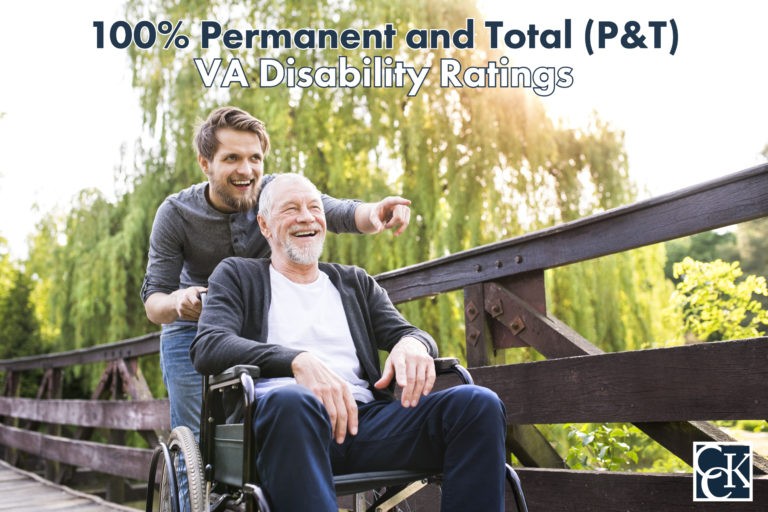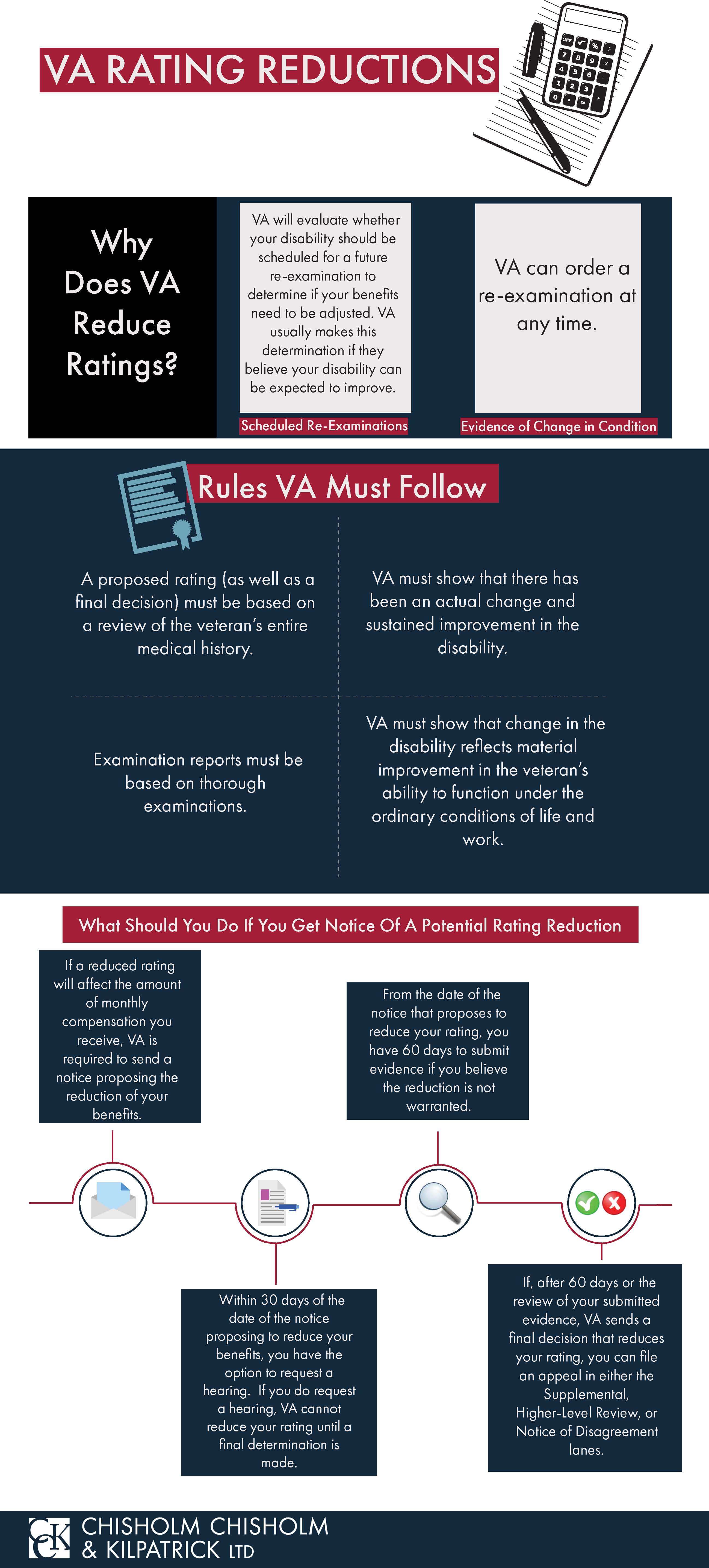100% Permanent and Total (P&T) VA Disability Ratings

CCK Law: Our Vital Role in Veterans Law
What is Permanent and Total Disability?
Permanent and Total disability, or P&T, refers to veterans whose disabilities are total (rated 100 percent disabling by VA) and permanent (have zero or close to zero chance of improvement).
Though “Permanent and Total” is often used as a single phrase, veterans can have a total disability that is temporary, or a permanent disability rated less than 100 percent. Permanent and total ratings are protected from being reduced and may entitle you or your dependents to additional VA benefits.
Total — Veterans’ disabilities are rated based on VA’s Schedule of Rating Disabilities. The rating levels for each type of disability are based on how much that disability impairs your ability to function in life and at work. A 100 percent rating indicates that your disability is completely, or “totally,” disabling.
Permanent — VA deems a disability “permanent” when it is reasonably certain, based on medical evidence, that the level of impairment will continue for the rest of the veteran’s life. For this reason, VA is allowed to take age into account when determining whether a disability is permanent, so it can be more difficult for younger veterans to be considered permanently disabled.
There are a few combinations of disabilities that are automatically deemed Permanent and Total, including the irreversible loss or loss of use (for example, amputation or paralysis) of:
- Both hands;
- Both feet;
- One hand and one foot;
- Sight in both eyes; or
- Becoming permanently helpless or bedridden.
There are a few scenarios in which a disability is less likely to be rated P&T:
- VA awards temporary total disability (100 percent rating) to veterans who are hospitalized for more than 21 days for a service-connected condition and for the six months following that hospitalization.
- Some totally disabling mental health disorders and cancers are not considered permanent because, according to VA, they are expected to improve with treatment.

Can VA Reduce a Permanent and Total Rating?
Many veterans fear having their rating reduced once it has been established. For some, a rating reduction could mean the difference between financial stability and instability. It is important to know that veterans have the ability to fight proposed rating reductions. Still, the possibility of a reduction can be overwhelming, frightening, and add substantial stress to a veteran’s life.
Those who are awarded Permanent and Total disability VA benefits are protected from the possibility of a reduction. If the rating was issued as Permanent and Total, the veteran will continue to receive the benefits for that rating for the rest of their life.
In cases involving Dependency and Indemnity Compensation (DIC), the spouse will need to have been married to the veteran for at least 10 years prior to the veteran’s death, otherwise the benefits will stop upon the veteran’s death. This rule applies even if the veteran was rated with a Permanent and Total rating.
How to Tell if Your VA Disability Rating is Permanent
Look at the decision letter VA sent you when granting benefits (your Rating Decision). On some Rating Decisions, there is a Permanent and Total box that will be checked if your 100 percent disability rating is permanent. On others, there may be a language like “Eligibility to dependents Chapter 35 DEA / CHAMPVA are established” or “No future exams are scheduled” – both of which indicate permanence. The exact language may vary with different VA regional offices.
If, however, the letter says that future exams are scheduled, then your total disability rating is considered temporary by VA.
Is VA Individual Unemployability (TDIU) Always Permanent?
Not necessarily. TDIU (or simply IU) stands for Total Disability based on Individual Unemployability. This benefit may be available to veterans who are unable to work because of their disabilities. Veterans who receive TDIU benefits are paid at the 100 percent VA rating compensation rate, even if they may not regularly reach the 100 percent threshold.
In other words, if you receive TDIU, you are considered totally (100%) disabled even if your disability rating is less than 100 percent. But TDIU can be permanent or temporary. So, it is important to check your rating decision as discussed above.
Can I Request a Permanent VA Rating?
If you believe (and you have evidence showing) that your total 100 percent disability is unlikely to improve at any point in the future, you can write a letter to your VA Regional Office requesting a permanent rating. With your letter, you should include medical evidence (like treatment records) showing that your medical condition cannot be expected to improve in the future.
Additional Benefits for Veterans with 100% Permanent and Total VA Ratings
Veterans with Permanent and Total ratings may be eligible for the following benefits:
- CHAMPVA (VA healthcare for your dependents)
- Chapter 35 Dependents Educational Assistance Program (Chapter 35 DEA)
- Dependency and Indemnity Compensation (DIC), often referred to as “death benefits”
- Certain state-level benefits for veterans
Note: Other factors may also be considered in determining eligibility for these benefits.
Dependency and Indemnity Compensation: Both CHAMPVA and Chapter 35 DEA require the veteran to be P&T (permanently and totally 100 percent disabled). For DIC, however, eligibility depends on how long the veteran has been considered P&T.
- If the veteran’s condition was rated P&T for 10 years immediately prior to their death, their dependents will be eligible for DIC.
- If the veteran’s condition was rated P&T for less than 10 years prior to their death, their dependents will only be eligible for DIC if the veteran died from a service-connected condition.
RELATED READ: Dependency and Indemnity Compensation: What is it, and do I qualify?
State benefits: Many states have special benefits for veterans who are permanently and totally disabled. Check out this website to find out which benefits your state offers.
Chisholm Chisholm & Kilpatrick May Be Able to Help You
VA does not always get it right the first time. If your VA claim has been denied, contact experienced attorneys at Chisholm Chisholm & Kilpatrick for a free case evaluation. We fight aggressively so our clients can get the benefits to which they are rightfully entitled. Contact us today at (800) 544-9144.
About the Author
Share this Post

